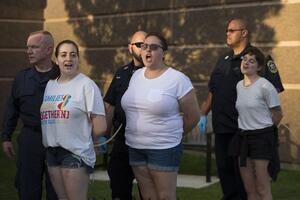Never Again: I was Arrested Protesting ICE
The day before the 4th of July, I was in jail.
I was one of 18 Jews arrested in Boston for blocking the South Bay Detention Facility to protest ICE and the concentration camps at the U.S. border. That number is significant: Chai, the Hebrew word for life, has a value of 18 in Hebrew numerology. We were protesting to protect immigrant lives, chaim.
People are visibly outraged by the atrocities committed against immigrant children as they are separated from their families and imprisoned in concentration camps. But it’s not just about children. As Cata Santiago declared at the Boston protest, “Children matter, and so do their parents.” They are also being locked up indefinitely in detention centers without access to proper hygiene and medical care. To be clear: In these camps, people are experiencing physical and psychological torture. And the crisis is not just at the border, where people face death as they flee for safety—it is in our communities. Our immigrant neighbors live in fear of ICE raids and roundups, which have been increasing in frequency and severity since 2016. They are then deported, or sent to concentration camps. These human rights abuses feel all too familiar as a Jew, which is why I am a member of Never Again, a movement of American Jews protesting ICE.
Growing up, my Jewish education stressed the importance of remembering our people’s long history of discrimination in order to ensure the liberation of all other people. For me, this goes beyond the distant and metaphorical memory of being “strangers in the land of Egypt,” but takes on personal significance. In the 1920s, my great-grandfather fled to America “illegally” through Canada to escape rising anti-Semitism in Poland. Soon after, the U.S. passed strict immigration laws targeting Jews and Russians. A few years later, officials came to my great-grandfather’s house, and because he didn’t have documentation, nearly deported him. It was through a loophole in paperwork that he was able to stay in America and did not perish with the rest of his family in the Holocaust.
The terror that today’s immigrants feel under the threat of ICE echoes the terror that he felt. We need to remember that the Holocaust did not happen overnight—it was a process. A group of people were systematically identified, dehumanized, and stripped of their rights, just like a different group of people are being targeted today. We see the signs, we know better, and must act before it is too late.
When I learned about the Holocaust in Hebrew school, I remember feeling most disgusted by the bystanders who saw these atrocities but did nothing, upholding the status quo by obeying and enforcing the law unquestioningly. I admired the civilians who resisted to protect Jews and other vulnerable communities.
So, in the footsteps of those brave resisters, I am taking action. I felt my great-grandfather with me as I marched with a thousand protestors on July 2nd and remembered those who resisted before us, singing a song written by fellow activist Emet Ezell, “We’ve got ancestors at our backs. We’ve got generations forward. We’ve got land and spirit in our bones. Never again. Para nadie.”
As we sang at the South Bay ICE detention facility, we saw immigrants banging on windows with signs that thanked us and called for help.
Soon after, I was arrested. Nothing could have prepared me for the experience. Aggressive police officers threatened force and denied medical treatment to fellow inmates. My hands literally turned purple and my skin broke from being zip-tied for hours while officers refused to loosen my restraints. I was trapped in a small cell without toilet paper, water, soap, or a functioning toilet. And yet, thanks to my extreme privilege as a white female-presenting person, I knew I was never at risk of real violence, that my detainment would be short-term, and that I would have legal representation. The treatment I experienced was nothing compared to the horrors of the mass incarceration system, nor of those in ICE and CBP custody.
Given that there are concentration camps on the border and atrocities being committed in my country, using my privilege to make a statement in this way—to visibly place my white body in harm’s way—was the least that I could do. Attention needs to be drawn to this crisis, and the world needs to know that my people will not stand for it. To be an American Jew today is to dissent. Will you join us?
You can organize an action in your area. You can donate to Movimiento Cosecha, a movement that fights for permanent protection, dignity, and respect for all immigrants. You can help bail immigrants out of these concentration camps by donating to national or local bail funds. You can also contact your members of Congress and tell them to close the camps, reunite families, and end the human rights abuses committed against migrants and refugees.
Never again means never again—for anyone.








Thank you for following the path of so many strong Jewish women resisters over the ages.
You are the hope of our country's future. Thank you for what you are doing. If all of us did what we are most capable of doing, we'd all be better off. Your list of suggestions is an excellent place to start.
thank you for your stand and for sharing your experiences.